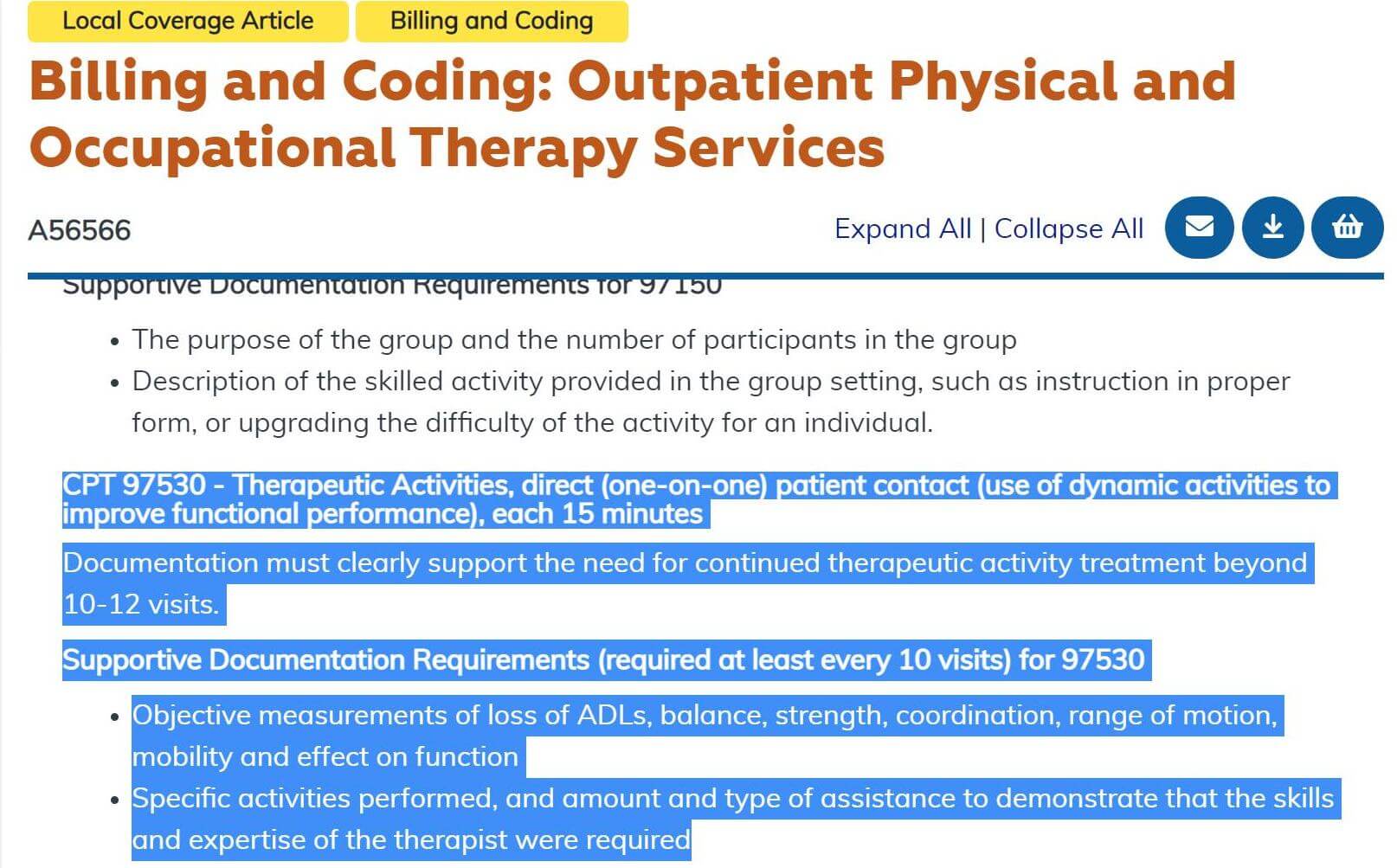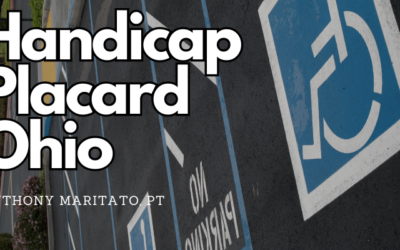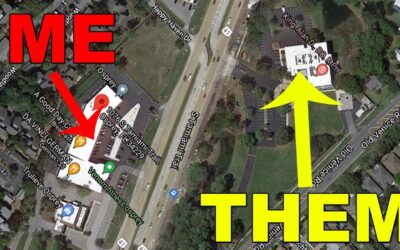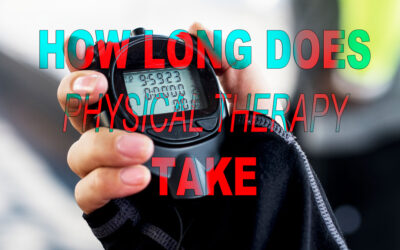CPT Code 97530 is Therapeutic Activity
CPT Code 97530 may be billed for therapeutic activity delivered by a licensed physical therapist or licensed occupational therapist.
Reimbursement rates for CPT Code 97530 will vary based on the third-party payer insurance contract, the total number of minutes utilized to deliver this service, and the service location.
CPT Code 97530 Modifiers
| Physical Therapy | GP |
| Occupational Therapy | GO |
| Speech-Language Pathology | GN |
Depending on third-party payer requirements, some insurance plans will require the rendering provider to include the GP, GO, or GN modifier to indicate who is delivering the service.
For example, Medicare Part B and some Medicare Advantage plans require all therapists to utilize the professional discipline modifier on each line item charge.
CPT Code 97530 Description
“CPT 97530 – Therapeutic Activities, direct (one-on-one) patient contact (use of dynamic activities to improve functional performance), each 15 minutes” – Source

Time-Based CPT Code
CPT Code 97530 is a time-based code. This means that each minute of time required to deliver the service must be recorded and accounted for. Each minute my be delivered “face-to-face” by the rendering provider and those minutes of time may not be billed for any other patient.
In order to bill one complete unit of care, the service must be delivered for a minimum of 8 continuous minutes.
By definition, time-based CPT codes are expected to average 15-minutes.
Two billable units of a time-based code may not be billed until the provider has passed the midway point of the next unit of time.
Adding Minutes of Time-Based CPT Codes
For example: If 1 unit of CPT Code 97530 can range between 8 and 22 minutes, the second unit may not be billed until the 15-minutes of the first unit plus the 8 minutes of the second unit has been delivered. This totals 23 minutes of time.
CPT Code 97530 Documentation Requirements
According to Medicare Article A56566 supportive documentation for billing CPT code 97530 must contain:
“Objective measurements of loss of ADLs, balance, strength, coordination, range of motion, mobility and effect on function [and] specific activities performed, and amount and type of assistance to demonstrate that the skills and expertise of the therapist”
Examples of Objective Measurements
- Functional Index Scores – Berg Balance Test, Tinetti Gait and Balance Tool, and many other professionally accepted functional outcome measures.
- Therapist’s assessment – As a licensed therapist you are trained and capable of assessing functional activity. For example, carrying a 10-lbs basket 25-feet or up a flight of stairs. Transferring from sit to stand. Bed mobility, etc.
- Utilize objective units of measurement – inches, pounds, minutes, etc.
Examples of Functional Activities
- Sit to stand
- Standing balance
- Walking
- Stairs
- Transfers
- Bed Mobility
- Bathing
- Dressing
- Feeding
- Grooming
- Carrying
- Pushing
- Pulling
- Lifting
Does CPT Code 97530 Require a 59 Modifier?
When billing CPT Codes some payers will indicate coding pairs that require a 59 modifier to indicate that the two procedure codes are unique or distinct.
In this 2020 WebPT article titled How to Handle Modifier 59 Denials for 97530 and 97140, the author discusses how a 59 modifier was required for the line item CPT Code 97530 when billed on the same date of service as CPT Code 97140 or the CPT Code 97530 would not be paid.
Updates to the National Correct Coding Initiative Edits (NCCI) have removed this pairing and as of 2022, a 59 modifier is not required when billing CPT Code 97530 and CPT Code 97140 on the same treatment day.
CPT Code 97530 Reimbursement Rates
As I mentioned above, reimbursement rates will vary by payer and location. Here are three reimbursement rates for Ohio third-party payers.
| Ohio Medicare | $36.21 |
| Ohio Medicaid | $17.64 |
| Ohio Bureau of Worker’s Compensation | $52.82 |
You can see from the table above, reimbursement rates will vary dramatically based on third-party payer and location.
When is CPT Code 97530 Used in Treatment?
Case Study
A patient is referred to physical therapy status post left total knee arthroplasty. This patient is 4 days post-op and has been discharged to home for mobile, outpatient therapy services.
Upon the initial evaluation it has been determined that prior to surgery, this patient was independent with ascending and descending a staircase within the home. It has also been determined by the therapist that a full return to premorbid status is reasonable.
CPT Code 97530 treatment might include a forward step up to 8-inch step with the use of one hand on the handrail. Three sets of 5 repetitions on each leg. Verbal and tactile cues may be utilized to help this patient learn proper sequencing. A review of the “up with the good and down with the bad” auditory reminder may have been required. Next, a step-down exercise from a 4-inch step may be appropriate utilizing both upper extremities for support and contact guard assistance. These two exercises may have started at 09:23 and ended at 09:32 for a total time of 9 minutes. As long as the therapist or therapist assistant under the supervision of the therapist was face to face with this patient during this treatment intervention, a single unit of CPT Code 97530 may be billed.
Additional Resources:
- For more information on billing CPT Code 97530 watch How to Document Therapeutic Activity (CPT code 97530) from the PTProgress YouTube Channel.
- For more information on billing CPT Code 97110 read CPT Code 97110 Therapeutic Exercise
Zero to Paid Medicare Billing Course – $499
Everything you need to know about Medicare part B billing for physical therapists, occupational therapists, and speech language pathologists.
If you have been thinking about starting a brick and mortar private practice, mobile practice, or side hustle, this course will provide you with the tools and confidence to get started.
Lifetime access $499
Handicap Placard Ohio
How to Obtain a Handicap Parking Permit in Ohio: A Comprehensive Guide Handicap parking permits are essential for individuals with disabilities, as they provide convenient and accessible parking spaces. In Ohio, the Bureau of Motor Vehicles (BMV) oversees the issuance...
How much does Medicare pay for physical therapy in [2023] UPDATED
How much does Medicare pay for physical therapy This article will specifically reference the Medicare Part B Physician Fee Schedule look-up tool to determine how much does Medicare pay for physical therapy. Medicare Part B payment rates for a physical therapy initial...
How to Choose a Location to Open a Physical Therapy Clinic in 2022
1. Understand Your Ideal Client Everything begins with knowing who your ideal client is. If you are focused on treating post surgical total knee referrals you will want to choose a physical therapy clinic location with easy access parking, no stairs or curbs, and wide...
Who is allowed to certify a Medicare physical therapy plan of care? 2022
Which providers are allowed to certify a Medicare physical therapy plan of care? There are several types of healthcare providers that are allowed to certify a Medicare physical therapy plan of care. Medical Doctor Doctor of Osteopathic Medicine Nurse Practitioner...
How Long Do Physical Therapy Sessions Take? 15, 30, or 60 Min?
My mom asked me "How long do physical therapy sessions take?" not because she was so eager to go, but rather because she wanted to get it over with.https://youtu.be/jwneMxD1jKsThe average physical therapy session at my clinic, Total Therapy Solutions, will last...



![How much does Medicare pay for physical therapy in [2023] UPDATED](https://learnmedicarebilling.com/wp-content/uploads/2021/10/CMS-Physician-Fee-Schedule-Physical-Therapy-Services-1-400x250.jpg)



